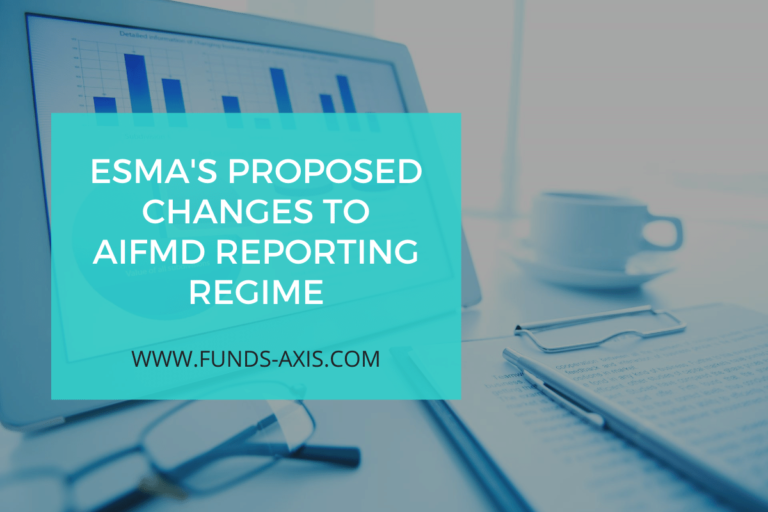All eyes may be on the month ahead as we enter the final countdown for the entering into force of ESMA’s liquidity stress testing guidelines, however, the past month still brought several important developments on topics such as:
- AIFMD;
- Money Market Funds;
- PRIIPs;
- Liquidity; and
- Short Selling
See below this month’s regulatory round-up of some of the interesting regulatory developments we have tracked throughout August.
For a full list of the developments click here.
Perhaps the biggest development of the month was ESMA’s lengthy letter to the European Commission highlighting areas to consider during the forthcoming review of the Alternative Investment Fund Managers Directive (AIFMD).
Topics in the letter include:
- Harmonization of the AIFMD and UCITSD regimes;
- Harmonized reporting for UCITS;
- Regulation for Host-AIFMs;
- Scope of additional MiFID II services;
- Delegation and substance requirements;
- Additional liquidity management tools;
- Leverage;
- AIFMD reporting regime and data use;
- Harmonization of supervision of cross-border entities;
- Semi-professional investors;
- A specific regime for loan origination funds;
- Application of depositary rules to CSDs;
- Proportionality principle for remuneration requirements;
- Sub-thresholds AIFMs;
- External valuer liability;
- Amendments to definitions;
- Clarification regarding reverse solicitation;
- Convergence in treatment of significant influence;
- Increasing digitization under the AIFMD; and
- The introduction of a depositary passport.
For further information see our 3 blogs on ESMA’s letter:
On 27th August, ESMA confirmed that the 2019 Guidelines on stress test scenarios under the Money Market Funds Regulation (MMFR) would be updated in 2020 to include a modification of the risk parameters to reflect recent market developments related to the COVID-19 crisis.
ESMA found that for some parameters, the 2019 scenarios has been exceeded by the extreme market movements observed during the COVID-19 crisis and therefore, the relevant factors would be updated accordingly.
PRIIPs. Often referred to as the problem child of European regulations. Last month, it was a problem for Exporo Investment GmbH with BaFin imposing a penalty of EUR 49,000.
The fine comes in response to Exporo Investment GmbH failing to provide retail investors with key information documents for packaged retail and insurance-based investment products (PRIIPs) before the retail investors became bound by a contract.
Interested in automating your PRIIPS KID and other fund documentation? We’ve got a solution for that. Get in touch to find out more.
The Swiss Federal Council has adopted revisions to the Collective Investment Schemes Act to introduce a new fund category – the limited qualified investor fund (L-QIF).
The introduction of the L-QIF will provide a flexible form of collective investment scheme under Swiss law that is not subject to FINMA approval and can therefore be launched much more quickly and cost effectively.
Parliament is expected to debate the draft in its 2020 winter session after the preliminary advisory committee.
It is likely to enter into force in 2022.
On 03rd August 2020, the Financial Conduct Authority (FCA) published a consultation paper on proposals to reduce the potential for harm to investors from the liquidity mismatch in open-ended property funds.
The new rules as proposed would require investors to notify fund managers in advance that they want to redeem their investment. The precise length of this notice period being proposed is between 90 and 180 days.
It is anticipated that the FCA will publish a Policy Statement with final rules as soon as possible in 2021.
On 11th August 2020, the Australian Securities and Investments Commission (ASIC) announced it was aware that valuations of illiquid assets have been challenging as a result of increased economic and financial uncertainties due to the COVID-19 pandemic.
On this note, ASIC issued a reminder to entities of their obligation to ensure that valuations of their managed fund assets are regular and reasonably current having regard to the nature of the assets.
One of ASIC’s focus areas this year is reviewing valuation practices amongst investment managers.
In early August, the European Fund and Asset Management Association (EFAMA) issued a letter to the European Commission on the subject of the PRIIPS draft Regulatory Technical Standards (RTS), calling for an immediate extension of the UCITS exemption, as well as an urgent Level 1 review of the regulation.
Together with a growing number of National Competent Authorities, the High-Level Forum on CMU and Better Finance, EFAMA called on Commission to implement an immediate Level 1 review, as legally required by the PRIIPs Regulation.
The U.S. Securities and Exchange Commission (SEC) recently proposed significant modifications to the mutual fund and exchange-traded fund disclosure framework. The proposed disclosure framework would feature concise and visually engaging shareholder reports that would highlight information that is particularly important for retail investors to assess and monitor their fund investments.
The proposal would:
- Require streamlined reports to shareholders that would include, among other things, fund expenses, performance, illustrations of holdings, and material fund changes;
- Significantly revise the content of these items to better align disclosures with developments in the markets and investor expectations;
- Encourage funds to use graphic or text features—such as tables, bullet lists, and question-and-answer formats—to promote effective communication; and
- Promote a layered and comprehensive disclosure framework by continuing to make available online certain information that is currently required in shareholder reports but may be less relevant to retail shareholders generally.
See our recent blog for further information on the proposed modernised shareholder reports.
On 07th August 2020, the Commission de Surveillance du Secteur Financier (CSSF) published an updated FAQ concerning the Luxembourg Law of 17 December 2010 relating to undertakings for collective investment:
Q: Do Loans constitute eligible investments for UCITS?
A: No. Loans cannot be considered as assets as referred to in Article 41 (1) and (2) (a) of the Law of 2010 as they do not qualify as:
- Money market instruments within the meaning of article 1 (23) of the Law of 2010 and Articles 3 and 4 of Regulation 2008, further clarified by the CESR guidelines;
- Transferable securities within the meaning of Article 1 (34) of the Law of 2010 and Article 2 of the Regulation 2008, further clarified by the CESR guidelines.
UCITS that would be invested in Loans have to disinvest from those positions by 31 December 2020, taking into account the best interests of investors. In addition, the prospectuses of those UCITS, offering the possibility to invest in Loans, have to be updated, by 31 March 2021 at the latest, in order to no longer provide for the possibility for such investments.
We provide out-of-the box coverage of regulatory rules, industry sector rules and prospectus / mandate rules. Regulatory rule sets include UCITS rules as well as US 1940 Act, Canadian Mutual fund rules, Hong Kong, Singapore, Swiss rules and many other rules based on fund domicile.
We can have you up and running in days with our technology solution for investment compliance!
On 26th August 2020, the Financial Conduct Authority (FCA) launched a survey for the joint Bank of England and FCA review of liquidity mismatch in open-ended funds.
The survey, which was initially due to be completed in March, follows the BoE’s financial stability report, which judged that the mismatch between redemption terms and the liquidity of some funds’ assets could become a systemic risk. In the report, the Financial Policy Committee said there should be greater focus on 3 specific principles:
- Measures of liquidity,
- Pricing, and
- Redemption notice periods.
The survey is a voluntary exercise and the data will provide an important element for the joint review. Asset managers included in this survey are being asked to respond to the questions on a best-effort basis by 30 September 2020.
On 28th August 2020, the Autorité des Marchés Financiers requested H2O Asset Management suspend all subscriptions and redemption on the H2O Allegro, H2O MultiBonds, and H2O MultiStrategies funds.
The decision was due to valuation uncertainties on the significant exposure of these funds to “private securities”.
In a statement by H2O they declared that the suspension period was temporary, and should last around four weeks.
The suspension is s a timely reminder of the importance of liquidity risk management.
Contact us today to learn more about our comprehensive solution for liquidity risk monitoring and stress testing.
On 27th August 2020, the Korean Financial Services Commission (FSC) announced its decision to extend the temporary ban on stock short sales for six months from September 16, 2020 to March 15, 2021.
The suspension is due to market volatility amid concerns over a resurgence in COVID-19 cases.
The jury is still out on the effectiveness of short selling bans with many regulators sceptical on their effectiveness – see our blog: Short Selling Bans: More Harm Than Good.
The Australian Government has published a consultation on the exposure draft of the Foreign Investment Reform (Protecting Australia’s National Security) Bill 2020.
The exposure draft Bill gives effect to the major reforms to the Foreign Acquisitions and Takeovers Act 1975 announced on 5 June 2020. The reforms update Australia’s foreign investment review framework in three broad ways:
- Addressing national security risks,
- Strengthening compliance and
- Streamlining investment in non-sensitive businesses.
During the last week of August, the New Zealand Stock Exchange suffered cyber-attacks resulting in no trading for three days and intermittent trading on the fourth.
This development will be of particular interest to those conducted their UCITS eligible market due diligence when considering whether the market:
- Operates regularly
- Is open to the public; and
- Adequately liquid
The trading halt will certainly have impacted the unimpeded transmission of income and capital of investors.
With these factors to consider, our Global Exchanges online portal provides investment professionals with detailed due diligence analysis when considering the eligibility of securities market.
Get in touch to find out more about our UCITS eligible market due-diligence.
See below last month’s blogs covering the latest developments impacting the fund industry.












